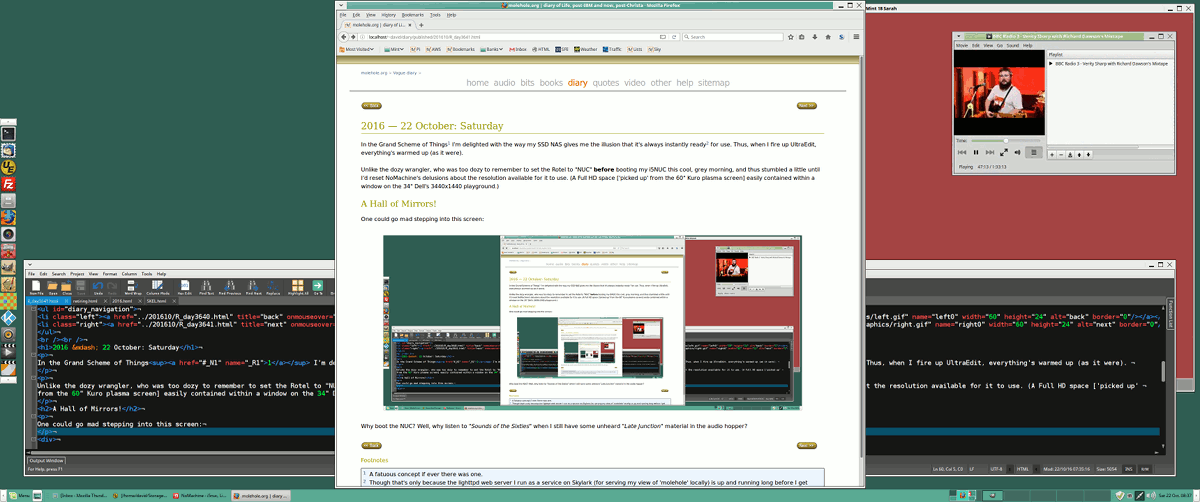2016 — 22 October: Saturday
In the Grand Scheme of Things1 I'm delighted with the way my SSD NAS gives me the illusion that it's always instantly ready2 for use. Thus, when I fire up UltraEdit, everything's warmed up (as it were).
Unlike the dozy wrangler, who was too dozy to remember to set the Rotel to "NUC" before booting my i5NUC this cool, grey morning, and thus stumbled a little until I'd reset NoMachine's delusions about the resolution available for it to use. (A Full HD space ['picked up' from the 60" Kuro plasma screen] easily contained within a window on the 34" Dell's 3440x1440 playground.)
A Hall of Mirrors!
One could go mad stepping into this screen:

Why boot the NUC? Well, why listen to "Sounds of the Sixties" when I still have some unheard "Late Junction" material in the audio hopper?
Last time I mentioned...
... books with odd bindings, at least they weren't (quite) outré enough to require the term "anthropodermic" to describe their full ghastliness. I've been led from the original article in Laphams Quarterly on a merry dance that has taken me as far as "Voyant Tools" used in text mining in West Virginia!
The chief merit...
... of this essay was to point me to a Disch I didn't know. [Pause] And of Ian Jack's piece, to remind me of this fine "Lion and the Unicorn" essay by George Orwell that I spotted on the day of the EU referendum. Another snippet:
England is not the jewelled isle of Shakespeare's much-quoted message, nor is it the inferno depicted by Dr Goebbels. More than either it resembles a family, a rather stuffy Victorian family, with not many black sheep in it but with all its cupboards bursting with skeletons. It has rich relations who have to be kow-towed to and poor relations who are horribly sat upon, and there is a deep conspiracy of silence about the source of the family income. It is a family in which the young are generally thwarted and most of the power is in the hands of irresponsible uncles and bedridden aunts. Still, it is a family. It has its private language and its common memories, and at the approach of an enemy it closes its ranks. A family with the wrong members in control — that, perhaps, is as near as one can come to describing England in a phrase.
Browsing through...
... files on an elderly backup drive — doesn't everyone do this? — I re-read "A Tuesday Afternoon with Hunter Diack" by Juliette Shapiro of East Sussex. It appeared in the Summer 2002 edition of "Verbatim". She describes, amusingly well, precisely the same experience that I still clearly remember having on my first encounter with Diack's "Test your own Wordpower". The only difference being that my encounter was in 1975. The book had appeared just after his death.
As I mentioned a while ago, some rotten cad walked off with my copy many years ago. This was a shame as I'd been keeping a note of my own test scores on the first page as I did each one. However, on an IBM trip to Dublin in April 1990 (and during a bomb scare that expelled us from the office for 90 minutes) I managed to grab a second-hand copy3 in the branch of "Forbidden Planet" I spotted in Dawson Street. I returned there the following day to buy a deliciously wicked pastiche? parody? ...

... you can see here (by Vittorio Giardino) of "Little Nemo", but that's definitely another story. As were the two consecutive evening visits I made with my IBM Marketing colleague to a lively gay bar where we enjoyed some excellent draught Guinness. I was recovering from 'flu at the time :-)
A Theory of Prostitution
The title of a 34-page paper by Lena Edlund and Evelyn Korn, in the Journal of Political Economy, vol. 110, no. 1, 2002. This caught my eye:
Medieval canon lawyer Johannes Teutonicus suggested that a woman who had sex with more than 23,000 men should be classified as a prostitute, although 40—60 would also do (Bullough and Bullough 1987, p. xi).
Progress in Computers
The title of the Prestige Lecture delivered by Maurice Wilkes to the IEE, Cambridge, on 5th February 2004. This caught my eye:
In fact the physical limitations that are now beginning to make themselves felt do not arise through shortage of electrons, but because the insulating layers on the chip have become so thin that leakage due to quantum mechanical tunnelling has become troublesome.
Happily, I left physics behind before I had to become entangled with tunnelling electrons.